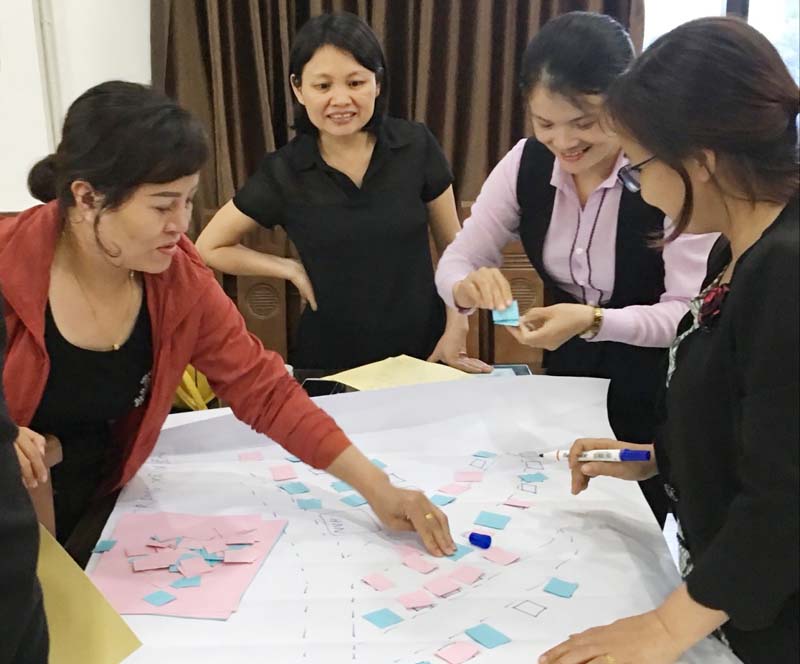
(HBO) - Hoa Binh is one of 21 provinces in Viet Nam selected to implement the program "Expanding the scale of clean water and rural sanitation" based on the results of loans from the World Bank (WB).
The provincial core cadre implementing the program
"Expanding the scale of rural sanitation and clean water" draws the
sanitation map of Hoa Binh province.
According to the Hoa Binh Centers for Disease Control, 76.49% of households in Hoa Binh province have hygienic latrines. This ratio has increased compared to 2018 (71.75%).
Hoa Binh is one of 21 provinces in Viet Nam selected to implement the program "Expanding the scale of clean water and rural sanitation" based on the results of loans from the World Bank (WB).
It is respected by 2020, 60 communes will have achieved "Sanitation of the whole commune"; 85 water works and communal latrines will be renovated and built.
With the assigned task, in 2018, the Health Sector of Hoa Binh province implemented intervention activities to support 11 communes in the province to achieve "Sanitation of the whole commune". In 2019, continue to intervene to support 12 communes in Kim Boi and Lac Son districts and register tally in other communes. In 12 communes, the poor households are supported 1 million VND, the near poor households 500,000 VND to build hygienic latrines.
In fact, raising awareness and changing people's behaviors is a core and sustainable solution. On June 28, 2019, the Department of Health issued a communication plan to change sanitation behaviors, develop rural sanitation markets in 2019.
Target in 12 intervention communes, 100% of households are propagated, advocacy for building and using the pupils at right age. 100% of households and teachers are provided with personal hygiene knowledge and washing their hands with soap. Store owners and manufacturers of construction materials agree to become collaborators and builders and receive training in sanitation market, construction techniques for latrines... 90% of commune and village health station staff, participants in the program were trained on hygiene promotion models, communication on sanitation behavior change. Local leaders, village heads and prestigious people are provided with information on the importance and specific contents of rural sanitation.
Currently, the Department of Health of Hoa Binh province is actively implementing the goals according to the set plan.
The Department of Education and Training of Hoa Binh province held a conference on March 18 to review the performance of the "Safe and Happy School" Project and set out tasks for 2025. The project, funded by the Taiwan Fund for Children and Families (TFCF), aims to create a safe, inclusive, and supportive learning environment for students. The event saw the attendance of representatives from the TFCF and 26 beneficiary schools.
With over 70% of their workers being women, trade unions across industrial parks (IPs) in Hoa Binh have been actively safeguarding their legal rights and interests while implementing initiatives to improve their income and well-being.
In recent years, the Hoa Binh provincial General Hospital has continuously innovated itself and improved the quality of medical services to meet the increasing needs of local people. With substantial investments in infrastructure and modern equipment, along with a team of highly qualified doctors and nurses, the hospital has gradually established itself as one of the leading medical units in the Northwestern region and a trusted destination for healthcare for people inside and outside the province.
From mastering the fundamentals of programming to achieving national recognition, the Programming Club of the Le Van Tam Primary School (STAR LVT28) in Hoa Binh city has made remarkable strides in the field of robotics.
The Ho Chi Minh Communist Youth Union Committee and the Vietnam Youth Federation chapter of Hoa Binh province organised a programme on March 12 to launch the "Digital Literacy" movement and an online quiz on the resolutions of the Vietnam Youth Federation congresses at all levels, as well as the Politburo's Resolution No. 57-NQ/TW on breakthroughs in the development of science, technology, innovation, and national digital transformation.
As climate change grows more unpredictable, the development of production forests has become essential - not just for economic growth, but for safeguarding the environment and maintaining ecosystem balance. By boosting local incomes, curbing natural disasters, preventing soil erosion, and protecting water resources, these forests play a crucial role in sustainable development.



